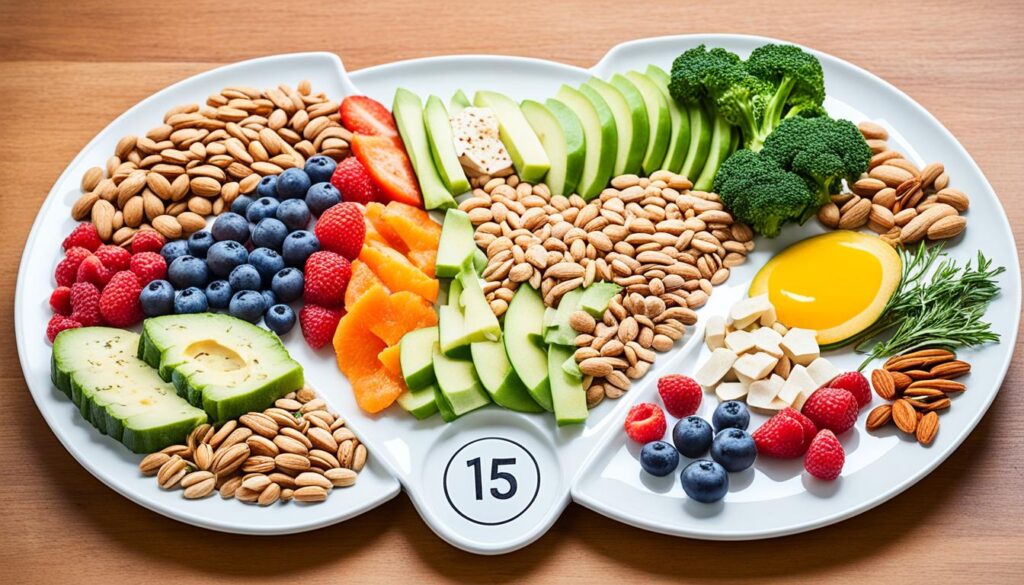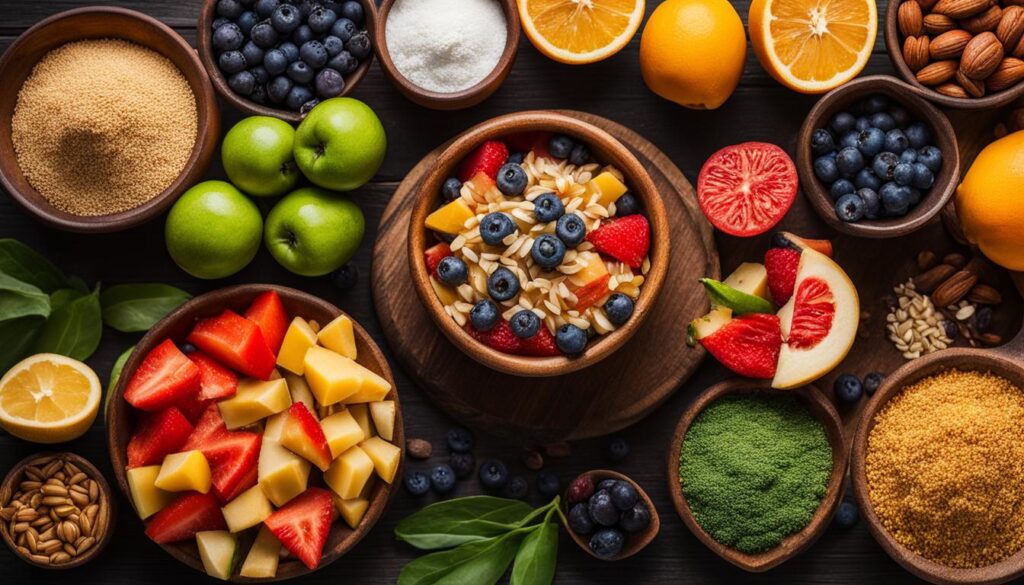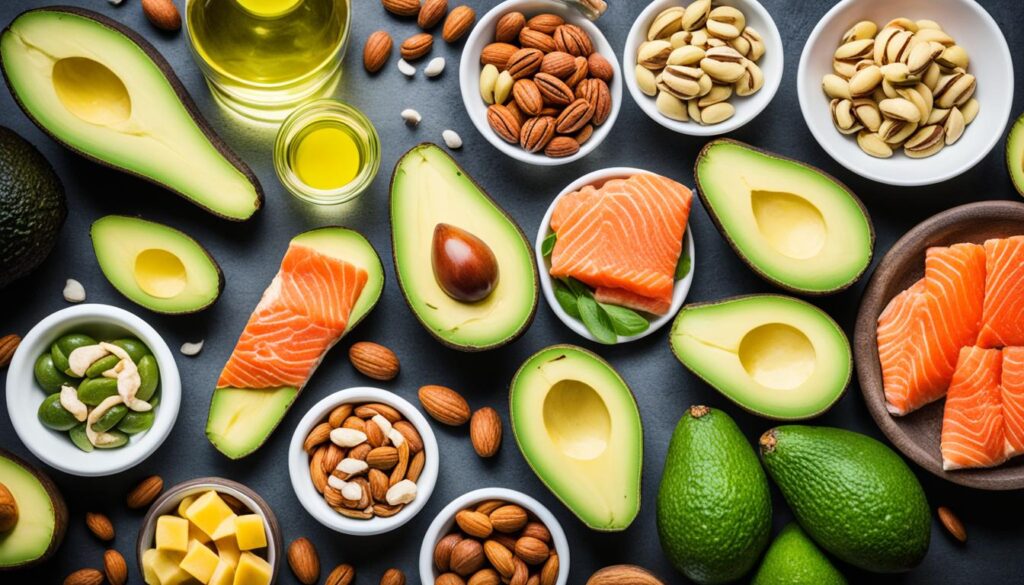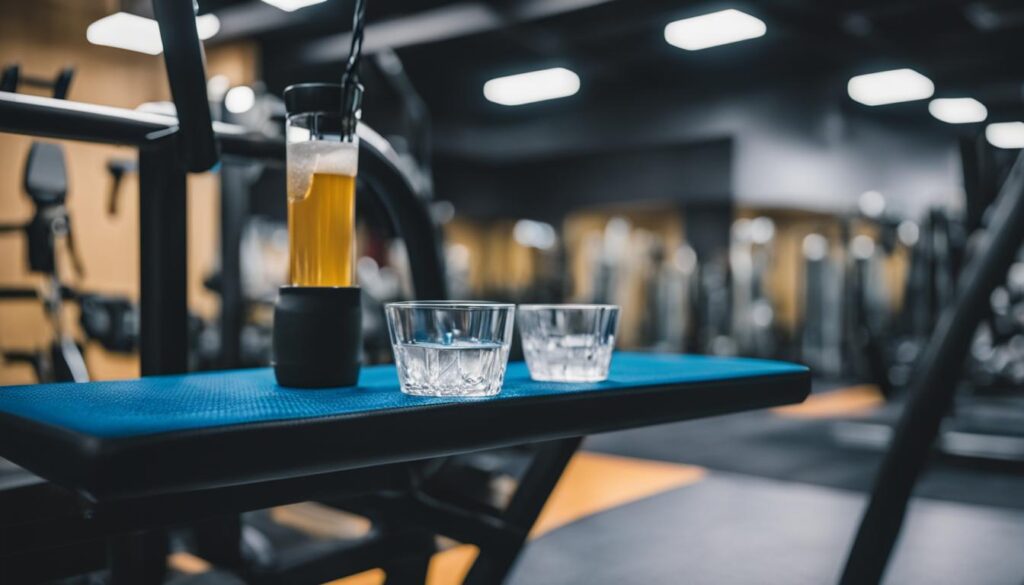If you’re looking to optimize your calisthenics training regimen, then you’ve come to the right place. As you likely know, calisthenics use bodyweight movements to build strength, increase flexibility, and improve overall fitness. It’s a great way to stay in shape without having to go to the gym, but to get the most out of it, you need to make sure that you’re following the right diet and nutrition tips.
In this article, we will explore the diet and nutrition tips that will complement your calisthenics training regimen, as well as provide you with some useful information on how you can take your training to the next level.
Key Takeaways
- Calisthenics use bodyweight movements to build strength and improve fitness.
- Nutrition plays a crucial role in optimizing calisthenics training results.
- You need to understand caloric intake, macro distribution, protein, carbohydrates, healthy fats, hydration, and supplements to improve your training results.
- Timing your meals, snacks, and listening to your body to adjust your nutrition plan is essential for optimal performance.
- Proper diet and nutrition play a significant role in enhancing your calisthenics training regimen.
Understanding Calisthenics Training Regimen

Before you start considering the diet and nutrition tips to boost your calisthenics training regimen, it’s crucial to understand what calisthenics entails. Calisthenics exercises are bodyweight movements, focused on developing strength, increasing flexibility, and enhancing overall fitness. A well-rounded calisthenics training regimen involves a combination of strength, endurance, and mobility exercises.
The exercises typically involve push-ups, pull-ups, squats, planks, and more. The goal is to encourage your body to work together and produce functional movements that will build stronger, leaner muscles overall.
The Benefits of Calisthenics Training Regimen
The benefits of a calisthenics training regimen are numerous. It focuses on using your own body weight to build strength and endurance, making it both challenging and rewarding.
“Calisthenics is about switching your body on so that you can handle anything. The basic and fundamental exercises can give you more strength and endurance.”
Calisthenics is a form of exercise that has been used for hundreds of years, dating back to the ancient Greeks. It’s becoming increasingly popular today because it is accessible, can be done anywhere, and is incredibly effective. It’s no wonder why calisthenics enthusiasts have become some of the strongest, most agile, and physically fit people around.
The Importance of Nutrition in Calisthenics
Nutrition is the backbone of an effective calisthenics training program. A balanced diet that provides your body with the right nutrients is essential to optimize your performance, enhance muscle growth, and support your overall health.
When you are engaged in rigorous calisthenics training, your body needs adequate fuel to perform at its best. The right diet plan should include sufficient quantities of protein, carbohydrates, and healthy fats to refuel your body, repair muscle tissue, and boost your overall energy levels.
Protein: Protein is an integral part of a balanced diet for calisthenics enthusiasts. It is vital for muscle repair and growth, two important aspects of calisthenics training. Consume 0.7-1 grams of protein per pound of body weight per day.
Carbohydrates: Your body needs carbohydrates to provide energy during your workouts. Focus on complex or whole-grain carbohydrates to provide steady energy levels. Aim to consume 2.2-3.6 grams of carbohydrates per pound of body weight per day.
Healthy Fats: Healthy fats are crucial for overall health and optimal performance in calisthenics. Include foods such as nuts, seeds, avocado, and fish in your diet to consume healthy fats that support brain function and hormone regulation. The recommended intake of healthy fats is 20-30% of your daily caloric intake.
| Macronutrient | Recommended Daily Intake | Benefits |
|---|---|---|
| Protein | 0.7-1 grams per pound of body weight | Aids in muscle repair and growth |
| Carbohydrates | 2.2-3.6 grams per pound of body weight | Provides energy during workouts |
| Healthy Fats | 20-30% of daily caloric intake | Supports brain function and hormone regulation |
Remember to stay hydrated throughout your calisthenics training. Drink plenty of water before, during, and after your workouts. A well-balanced diet can provide most of the nutrients you need, but certain supplements such as creatine, beta-alanine, and caffeine can support energy levels, muscle recovery, and overall health. Talk to a health professional before taking any supplements.

Caloric Intake and Macro Distribution
One of the most crucial factors that affect your calisthenics performance is your diet. It’s not just about eating healthy foods but also consuming the right amount of calories and understanding your macro distribution. Caloric intake refers to the number of calories you consume each day, while macro distribution refers to the proportion of carbohydrates, protein, and fat you take in as your energy source. Your total caloric intake and macro distribution depend on various factors such as your age, gender, weight, and activity level.
To figure out your required caloric intake, calculate your total daily energy expenditure (TDEE), which is the number of calories you burn every day, taking into account your level of physical activity. By subtracting a small amount of calories from your TDEE, you can gradually reduce your weight. In contrast, by adding more calories to your TDEE, you can gain some weight. Choosing the appropriate calorie intake can optimize your energy levels, help in muscle repair and growth, and improve overall performance.

Macro Distribution
After calculating your daily calorie intake, you should also consider macro distribution, which involves breaking down your calorie intake into the right proportion of protein, carbohydrates, and fats you need to consume each day. A well-balanced macro distribution plan helps fuel your body during exercise and assists with muscle repair and growth.
| Macro Nutrient | Calories per gram | Proportion of Daily Caloric Intake |
|---|---|---|
| Protein | 4 | 20-30% |
| Carbohydrates | 4 | 40-60% |
| Fats | 9 | 20-30% |
Make sure to monitor your daily intake of protein, carbohydrates, and fats regularly to ensure that you are getting the optimal nutrition for your calisthenics training regimen. With the right caloric intake and macro distribution, you can expect improvements in your strength, endurance, and overall performance.
Protein for Muscle Repair and Growth
When it comes to building muscle in calisthenics, protein is an essential nutrient as it aids in muscle repair and growth. After an intense workout, your muscles need amino acids to repair the damaged tissue, and protein-rich foods can provide them. Consuming an adequate amount of protein promotes the development of lean muscle mass that is necessary for enhancing your performance.
The recommended daily protein intake for individuals who engage in calisthenics is 1.2 to 1.7 grams per kilogram of body weight.
| Protein Sources | Protein Content per 100 grams |
|---|---|
| Chicken Breast | 31g |
| Turkey Breast | 29g |
| Egg Whites | 11g |
| Soybeans | 36g |
| Greek Yogurt | 10g |
| Salmon | 20g |
There is a wide variety of protein sources available for calisthenics enthusiasts, depending on their preferences and dietary restrictions. Some of the most popular options include chicken breast, turkey breast, egg whites, soybeans, Greek yogurt, and salmon.

Incorporating protein-rich foods into your diet is crucial for supporting optimal muscle repair and growth. Try to include protein sources in every meal, especially after a workout. Focus on lean options, such as chicken, turkey, and fish.
Carbohydrates as Energy Fuel
During exercise, your body requires energy to perform at its best, and carbohydrates are the primary source of fuel for your muscles. Consuming an appropriate amount of carbohydrates can help improve your athletic performance and support your calisthenics training regimen.
It is recommended that carbohydrates make up 45-65% of your total daily caloric intake, depending on your needs and activity level.
There are two types of carbohydrates: simple and complex. Simple carbohydrates, also known as sugars, are broken down quickly by the body and provide energy rapidly. They can be found in fruits, candy, and processed foods. Complex carbohydrates, on the other hand, are broken down more slowly and provide sustained energy throughout the day. These can be found in whole grains, vegetables, and legumes.
Choose healthy carbohydrate options to fuel your calisthenics training sessions. Incorporate complex carbohydrates into your diet, such as brown rice, sweet potatoes, quinoa, and whole-wheat pasta, to provide sustained energy throughout your day. Fruits, dairy products, and some vegetables are also excellent sources of carbohydrates.

Table: Sources of carbohydrates and their benefits for calisthenics training regimen
| Source | Benefits |
|---|---|
| Whole grains | Provides sustained energy |
| Sweet potatoes | Rich in complex carbohydrates and fiber, and supports muscle growth |
| Quinoa | Provides sustained energy and supports muscle growth and repair |
| Fruits and vegetables | Provides antioxidants, vitamins, and minerals, and support muscle recovery |
| Dairy products | Good source of calcium and provides energy |
Incorporating carbohydrates into your calisthenics diet guide can enhance your athletic performance and optimize your training results. Choose healthy options and adjust based on your individual needs and activity levels.
Healthy Fats for Optimal Performance
When it comes to calisthenics, it’s essential to fuel your body with the right nutrients to perform at your best. Often overlooked, healthy fats are a vital part of a well-rounded diet and can contribute to optimal performance. Incorporating healthy fats into your nutrition plan can benefit your brain function, hormone regulation, and overall health.
Contrary to popular belief, not all fats are bad for you. Healthy fats, such as monounsaturated and polyunsaturated fats, are essential for your body’s proper functioning. These types of fats can be found in foods such as:

| Healthy Fat Sources | Type of Fat |
|---|---|
| Avocado | Monounsaturated |
| Nuts and seeds (e.g., almonds, chia seeds, flax seeds) | Polyunsaturated |
| Fatty fish (e.g., salmon, tuna) | Polyunsaturated |
| Olives and Olive Oil | Monounsaturated |
| Coconut and Coconut Oil | Saturated |
It’s important to remember that fats contain more calories per gram than protein or carbohydrates. Still, incorporating them into your diet in moderation can have many health benefits, including increased satiety and better absorption of certain vitamins.
Overall, incorporating healthy fats into your calisthenics nutrition plan can help you maintain optimal performance and support your overall health. Consider incorporating these healthy fat sources into your meals and snacks to get started.
Hydration and its Impact on Performance
Staying properly hydrated is essential for optimal performance in calisthenics. Dehydration can lead to fatigue, muscle cramps, and decreased endurance, ultimately hindering your progress. To avoid these issues, it’s crucial to maintain adequate hydration levels during your workouts.
The amount of water you should drink depends on various factors, such as your body weight, activity level, and environmental conditions. A general guideline is to drink at least eight 8-ounce glasses of water per day. However, during intense calisthenics sessions, you may need to increase your water intake to compensate for the fluids lost through sweat.
Here are some tips to help you stay hydrated during your calisthenics training:
- Drink water throughout the day, not just during your workouts.
- Keep a water bottle with you at all times to make it easier to sip water throughout the day.
- Avoid sugary drinks, caffeine, and alcohol, as these can increase dehydration.
- If you’re training outdoors, consider bringing a hydration pack or water bottle that you can easily carry with you.
Remember, proper hydration isn’t just important during your workouts; it’s also crucial for muscle recovery after your training sessions. Make sure to drink plenty of water throughout the day to support optimal performance and recovery.

| Dehydrated | Properly Hydrated | |
|---|---|---|
| Physical Performance | Decreased endurance and power | Increased endurance and power |
| Muscle Recovery | Slower recovery time | Faster recovery time |
| Cramping | Increased likelihood of cramping | Decreased likelihood of cramping |
Make sure you prioritize hydration in your calisthenics training regimen. By staying hydrated, you can optimize your performance, avoid fatigue and cramping, and support muscle recovery.
Timing Your Meals and Snacks
Timing your meals and snacks can give you an edge in calisthenics. Here are some tips to help you structure your eating schedule to fuel your workouts and aid in recovery:
- Pre-Workout Meal: Eat a balanced meal rich in carbohydrates and protein 2-3 hours before your workout. This will give your body the necessary energy to perform at its best.
- Post-Workout Meal: Consume carbohydrates and protein within 30 minutes after your workout. This will aid in muscle recovery and growth.
- Snacks: Include snacks rich in protein and carbohydrates between meals to maintain energy levels and promote muscle repair.
- Hydration: Proper hydration is essential for optimal performance. Drink plenty of water before, during, and after your workout.
By timing your meals and snacks, you can ensure that your body is receiving the necessary nutrients to support your calisthenics training. Keep in mind that everyone’s body is different, so experiment with different meal and snack times to find what works best for you.

Supplements to Consider
While a well-balanced diet can provide most of the nutrients you need, certain supplements can help enhance your calisthenics training regimen. Here are some supplements you may want to consider:
| Supplement | Benefits |
|---|---|
| Whey Protein Powder | Increases protein intake for muscle repair and growth |
| Creatine | Enhances strength, endurance, and muscle growth |
| BCAAs | Helps reduce muscle soreness and fatigue |
| Fish Oil | Reduces inflammation and enhances joint health |
Keep in mind that supplements are not a substitute for a healthy diet, and it’s important to consult with your doctor or a registered dietitian before adding any new supplements to your regimen. Choose high-quality supplements from reputable brands, and follow the recommended dosage for optimal results.

Listening to Your Body and Adjusting
Calisthenics is a highly personalized form of exercise, and it’s essential to listen to your body’s needs to get the most out of your training and nutrition plan. What works for one person may not work for another, so it’s crucial to understand and adjust to what your body is telling you.
One way to listen to your body is to pay attention to how you feel after each workout. Are you fatigued, sore, or experiencing prolonged recovery times? If so, consider adjusting the intensity or duration of your training session. Alternatively, if you feel energized and motivated, you may be ready to step up and challenge yourself further.
Another way to adjust your calisthenics regimen is to be aware of your nutrition. Keeping a food journal or using a fitness app can help you track your caloric intake and macro distribution and identify any patterns in your diet that may be affecting your performance. From there, you can adjust your diet to enhance your energy levels, support muscle recovery and growth, and optimize your overall health.
By listening to your body and making informed adjustments to your training and nutrition plan, you can achieve your calisthenics goals and continue to improve over time.
Conclusion
Now that you have a better understanding of the diet and nutrition tips that can enhance your calisthenics training regimen, it’s time to put them into practice. Remember that a well-rounded calisthenics nutrition plan should include the right balance of macronutrients, including carbohydrates, protein, and healthy fats, and you should stay properly hydrated throughout your training sessions.
Don’t forget to listen to your body’s signals and make adjustments to your diet and nutrition plan accordingly. Whether you are a beginner or an experienced calisthenics enthusiast, a well-structured nutrition plan can help optimize your strength, recovery, and overall performance.
Incorporate the tips mentioned in this article into your calisthenics diet guide and enjoy the benefits of a more balanced nutrition plan. By fueling your body with the right nutrients at the right times, you can take your calisthenics journey to new heights and achieve your fitness goals.
FAQ
What diet and nutrition tips complement a calisthenics training regimen?
Following the right diet can help optimize your strength, recovery, and performance in calisthenics. By fueling your body with the right nutrients, you can enhance your training and achieve better results.
What is a calisthenics training regimen?
Calisthenics is a form of exercise that uses bodyweight movements to build strength, increase flexibility, and improve overall fitness. It involves exercises such as push-ups, pull-ups, squats, planks, and more.
Why is nutrition important in calisthenics?
Nutrition plays a crucial role in calisthenics as it provides the fuel your body needs to perform, aids in muscle recovery and growth, and supports overall health. By following a balanced diet, you can optimize your training results.
How should I manage my caloric intake and macro distribution?
It’s important to understand your caloric intake (number of calories consumed) and macro distribution (the breakdown of calories into carbohydrates, protein, and fat). Finding the right balance is essential for energy levels, muscle repair, and overall performance.
Why is protein important in calisthenics?
Protein aids in muscle repair and growth. Consuming an adequate amount of protein helps repair damaged muscle tissues and promotes the development of lean muscle mass. Learn about recommended protein sources and consumption amounts.
What role do carbohydrates play in calisthenics?
Carbohydrates are the primary source of fuel for your body during exercise. They provide the energy your muscles need to perform at their best. Discover the different types of carbohydrates and how to incorporate them into your diet for optimal performance.
Why are healthy fats important for calisthenics?
Healthy fats are essential for a balanced diet and can contribute to optimal performance in calisthenics. They benefit brain function, hormone regulation, and overall health. Understand the benefits of incorporating healthy fats into your nutrition plan.
How does hydration impact calisthenics performance?
Staying properly hydrated is crucial for optimal performance in calisthenics. Learn about the importance of hydration, the amount of water you should drink, and tips to stay hydrated during your training sessions.
How should I time my meals and snacks for calisthenics?
The timing of your meals and snacks can significantly impact your calisthenics performance. Discover how to structure your eating schedule to provide your body with the necessary nutrients at the right times for fueling workouts and aiding in recovery.
Are there any supplements to consider for calisthenics?
While a balanced diet provides most nutrients, certain supplements can complement your calisthenics training regimen. Explore popular supplements that may support energy levels, muscle recovery, and overall health.
How should I listen to my body and make adjustments?
Each individual is unique, and it’s important to listen to your body’s signals and make adjustments to your diet and nutrition plan accordingly. Get tips on how to tune in to your body’s needs and make informed choices.
What is the conclusion about diet and nutrition tips for calisthenics?
Proper diet and nutrition are vital for enhancing your calisthenics training regimen. Fuelling your body with the right nutrients and following the tips mentioned in this article can optimize your strength, recovery, and overall performance in calisthenics.


Leave a Comment